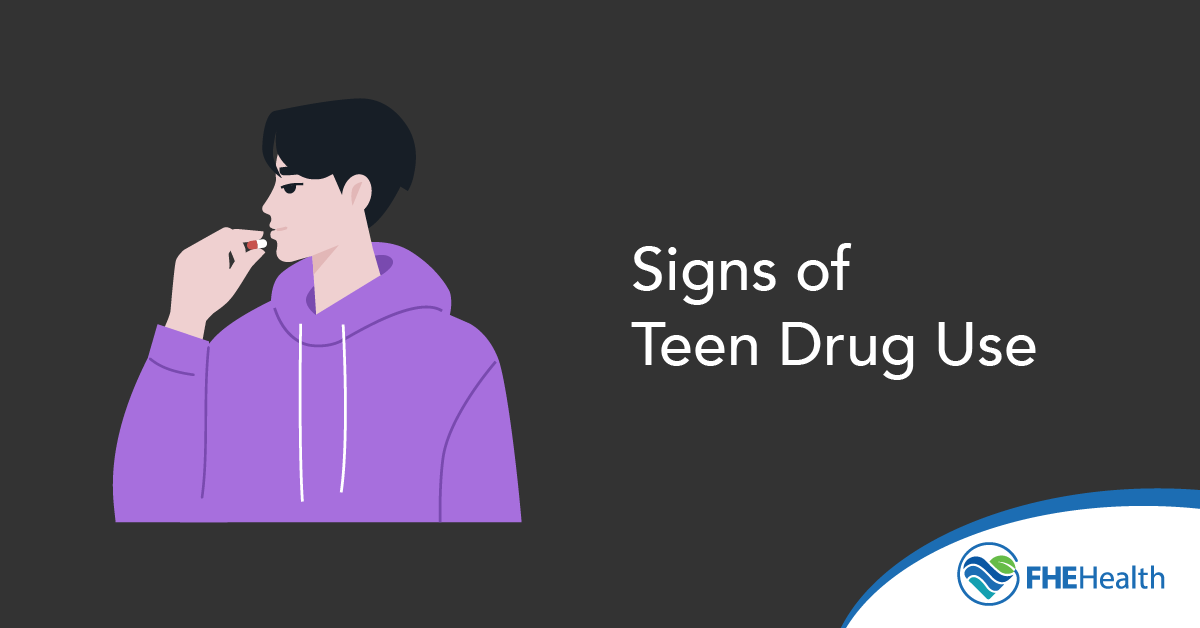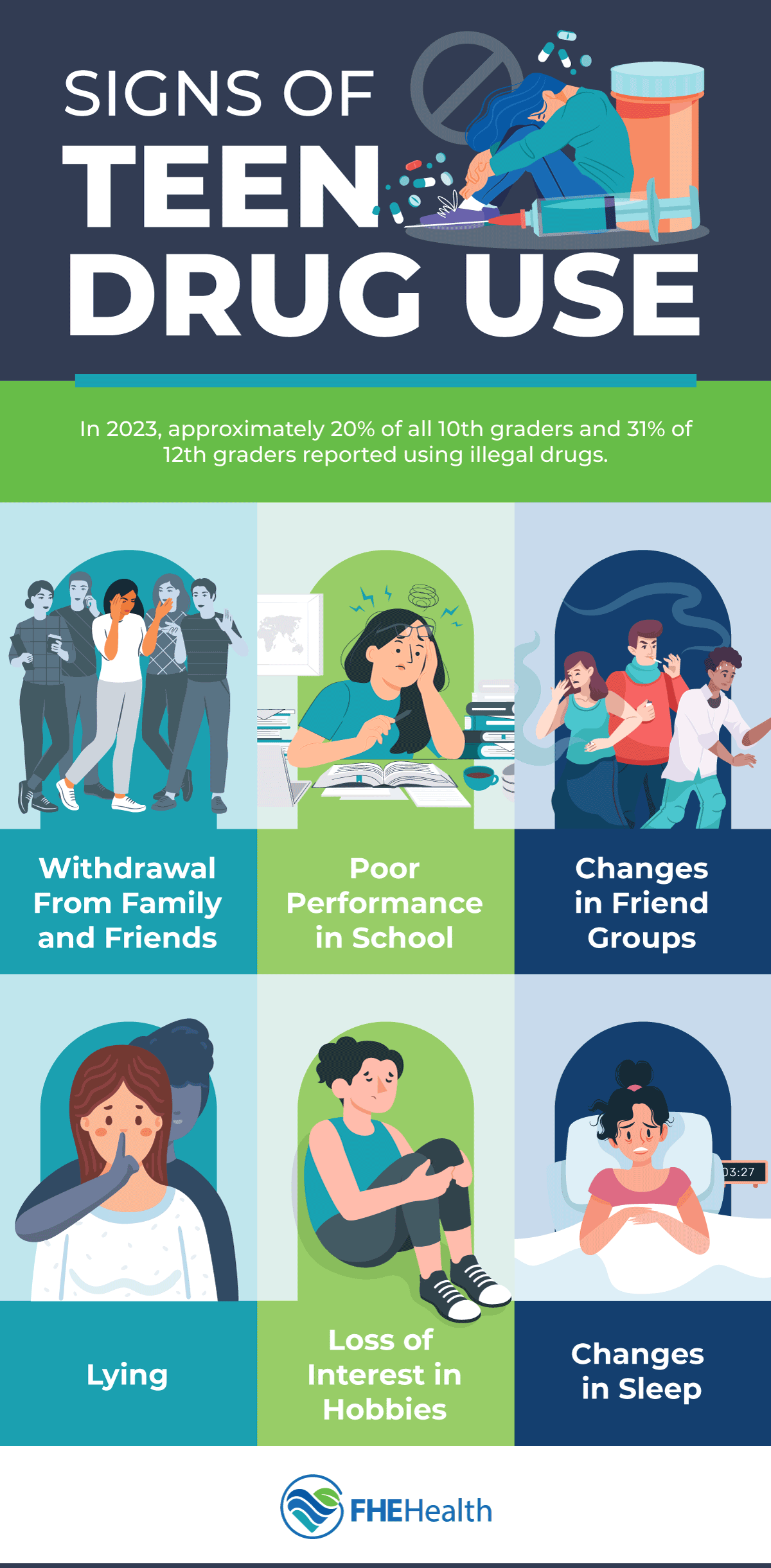
Parenting a teenager isn’t for the faint of heart. Hectic schedules, peer pressure, homework and attitudes are all part of the process. But how do you know when a sudden bout of rebellion is a cry for help or an indication of a more serious issue, such as teen drug abuse? In 2023, approximately 20% of all 10th graders and 31% of 12th graders reported using illegal drugs. While experimentation isn’t uncommon among school-aged children, drug use can quickly turn into an addiction. It’s important to learn to spot the warning signs and know how to talk to your teen if you suspect they might be drinking or abusing drugs.
Common Behavioral Changes in Teens
Hormones and normal brain development can cause teenagers to act defiantly and show disrespect to their parents and siblings. Other typical behaviors might include spending more time with friends than family, enjoying time alone in their room and experimenting with drugs and alcohol. When these behaviors become extreme or out of character, it could be a behavioral warning sign of drug abuse.
Withdrawal From Family and Friends
When a teen struggles with substance abuse, they may isolate themselves from family and friends to avoid embarrassment or judgment. During this time, they may hide their addiction or spend more time trying to obtain drugs and alcohol.
- Poor Performance in School
Skipping school, failing classes and a sudden loss of interest in school and school-related activities can be a warning sign of drug abuse, especially if your teen was once a good student. - Changes in Friend Groups
It’s okay to make new friends, but when a new peer group has a questionable reputation, it may indicate a drug or alcohol problem. - Lying
If you constantly catch your teen lying or find they’re being more secretive than usual, it may be a red flag for drug use. Make sure you address the dishonesty and provide consequences, such as taking away their phone, making them do extra chores or grounding them. - Loss of Interest in Hobbies
If your teen has played sports for years or enjoyed dance and suddenly loses interest in something they’ve always loved, they could be struggling with substance abuse. - Changes in Sleep
Alcohol and drug use can lead to irregular sleep patterns. Erratic sleep schedules, insomnia and excessive drowsiness during the day can be warning signs.
Physical Symptoms to Look For
Aside from behavioral changes, there are multiple physical warning signs of drug use in teens to look out for. These symptoms may vary depending on the substance being abused.
- Bloodshot Eyes
Stimulants, such as alcohol and marijuana, can cause bloodshot eyes or make the pupils appear bigger. Opioids, including oxycodone and hydrocodone, make the pupils small. - Changes in Weight
A sudden change in appetite, whether your child is eating more than normal or not eating at all, can be associated with drug use. - Nosebleeds
Cocaine can cause unexpected nosebleeds, especially with repeated or frequent use. This habit can cause permanent damage and irritation of the nasal passages and lungs. - Poor Hygiene
Teens involved with drugs and alcohol tend to care more about the substance than taking care of their appearance. Wearing the same clothes multiple days in a row or failing to pay attention to personal hygiene is a sign of addiction. - Poor Coordination or Slurred Speech
Nearly all drugs can cause poor coordination or slurred speech after use. Pay close attention to your teen after a night on the town.
How to Talk to Your Teen About Drug Use
If you’ve found drugs in your teen’s room or you have suspicions they’re using, it might be time to have a heart-to-heart. Starting a conversation about teen drug abuse can be uncomfortable, but it’s extremely important if you want to maintain open and honest communication.
- Choosing the Right Time
Avoid confronting your teen when you’re angry or you feel combative. Choose a time when you feel calm and relaxed and approach the situation with love and concern. - Listen Without Judging
Let your teen know your questions come from a place of love and not judgment. Express concern over the situation, and try to avoid getting angry. - Avoid Yes or No Questions
Encourage your teen to talk to you by asking open-ended questions instead of ones with yes or no answers. - Provide Facts
Ask if they understand the consequences of using, and provide real information and facts about drug abuse and its effect on relationships. - Offer Support
If your teenager admits to using drugs or alcohol, it’s best to stay calm. Offer to assist them in getting help through counseling, support groups or a treatment facility,
The Role of Peer Pressure in Teen Drug Use
Peer pressure plays a major role in teen drug abuse. This could be due to the following:
- A desire to fit in
- Influence of social media platforms
- Fear of being rejected
- Anxiety and stress from saying no
What to Do If You Suspect Drug Use
If you suspect teen drug abuse, there are a few steps you should take immediately.
- Make Notes
Keep a journal or notebook of behavioral and physical changes, such as stealing, lying and unusual mood swings. Tracking these behaviors helps you notice when things are getting better or worsening. - Set Expectations
Set clear expectations and rules regarding drug use in your home. Make sure your teen understands the consequences of drug abuse. - Seek Professional Help
in some cases, you may have to schedule an intervention if the situation gets out of hand. Contact the school counselor or an addiction specialist for support. - Provide Support During Treatment
Support from family and friends can increase the chances of recovery. Help your teen find positive outlets to take the place of drug abuse.
Getting Help With Teen Drug Abuse
If you notice any warning signs of teen drug abuse in your home or need to talk to someone to get help, contact us at FHE Health to learn about the available options. We can get your teen the help they need.







